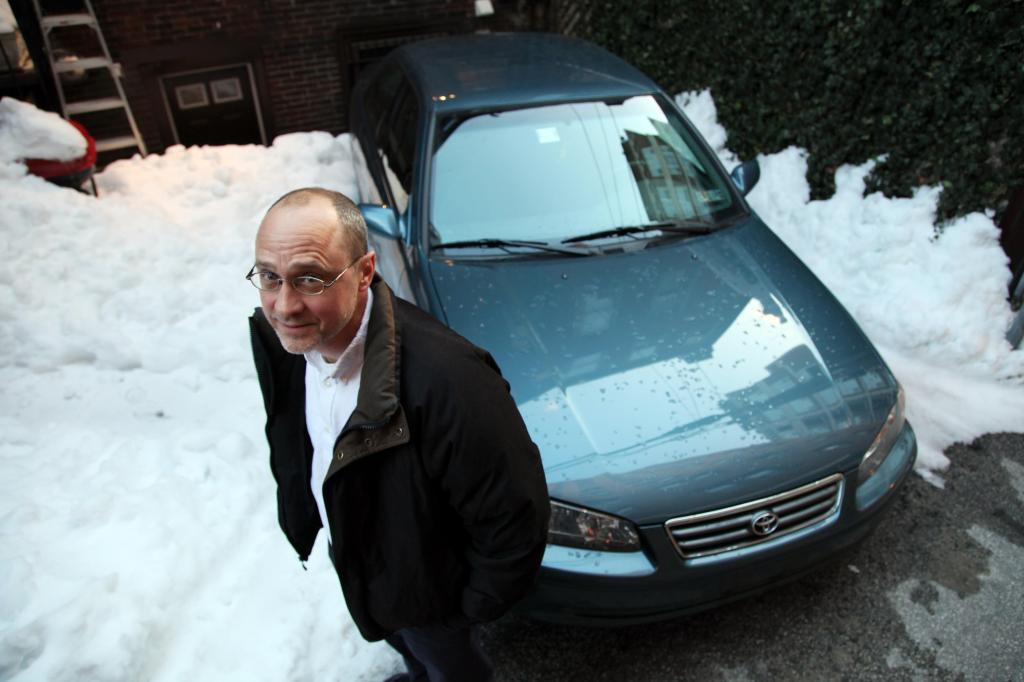On new-car lots, they’re the shoppers who don’t get a rush from what’s under the hood. That’s assuming they even venture onto lots that offer anything not pre-owned.
They are economists, finance professors, and accountants – numbers professionals who, by nature, are analytical, not impulsive.
To them, a car is something that gets you from one place to another. The cheaper it comes, and the bigger the gas mileage, the better. Extras? Get real.
As American consumers engage in collective hand-wringing over whether to buy new wheels now, amid a pileup of uncertain economic conditions and auto recalls, here is a glimpse into the car-buying philosophies and practices of some of the region’s fiscal conservatives.
It’s a thoroughly unscientific survey – the kind these linear minds would get their jollies finding fault with.
ECONOMICS PROFESSOR: USED CAMRY
About a month ago, John Caskey, an economics professor at Swarthmore College, replaced a 1995 Toyota Camry that had logged 100,000 miles with a 2001 model – odometer reading: only 33,000 miles.
Fiscal prudence doesn’t allow him to even flirt with buying new.
”It would be painful to me to go buy a $40,000 car, drive it, and depreciate it so fast,” said Caskey, 54, describing himself as someone who does not suffer from ”the romance of the car.”
That’s bad news to his kids, a son, 12, and a daughter, 9.
”They’re embarrassed,” especially because their father’s tastes are for a decidedly grown-up car, Caskey said. ”They’d love to have an SUV.”
Even with the recent recalls, which have not involved his vehicles, Caskey is a Camry loyalist, primarily, he said, because ”it’s just a practical car; not too expensive.”
But what if the Philadelphia resident had money to burn? What would be parked in the home garage of his fantasies?
”It would be fun to have a Miata,” he allowed. He actually rented one for a day, ”to satisfy my need.”
”The only thing that took away from it,” he said, ”was in big painted letters on the door it said: ‘PhillyCarShare.’ ”
FINANCE PROFESSOR: 2003 BEETLE
Jacqueline Garner, a finance professor at Drexel University, is, quite bluntly, cheap. ”Almost to a fault,” she admitted.
A few years ago, she made $35,000 on a consulting job and has ”yet to spend a dime of it. I immediately invested it.”
She did the same, she said, with the weekly allowance she got as a child in Alabama. So when it comes to buying cars, she always buys a five-speed transmission, never an automatic, because ”that will take the price of the car down.”
These days, you’ll find her behind the wheel of a navy blue 2003 Volkswagen Beetle – bought at the end of that year to get a better deal – that she plans on driving ”until the wheels fall off.” Before the Beetle, she owned a VW Rabbit for 15 years.
Living and working in the city, her automotive requirements are twofold: ”I need a car that can get me to work and park in a small place.”
She’s a teacher; thus it comes as no surprise that Garner, 47, recommends that consumers do a lot of homework before they walk into a dealership, particularly in these economically challenged times.
Most important, she said, is negotiating the price of the car, not the payments: ”If you just make the choice based on the payment, you could overpay.”
GLOBAL TAXES: FOREIGN CARS
John Brady, a global tax account leader at Ernst & Young, has four kids and four cars: a 2009 Honda CR-V; a 2006 Volkswagen Jetta; a 2004 Camry; and a 2000 Honda EX.
He’s in the hunt for a Toyota hybrid – though somewhat troubled by the braking problems and other matters that have led the Japanese automaker to issue unprecedented recalls of its star hybrid, the Prius, and other models.
As an accountant who advises businesses on the fiscal attributes of going green, Brady, 51, figures he should drive the drive. His ultimate selection will come down to quality, safety and price, he said.
With price, it’s not just about affordability, he said.
”If I could afford a $50,000 car, I’d go to a $25,000 car,” he said. ”I’d feel too guilty driving around in the lap of luxury if I had people close to me needing a little here and there.”
DEPARTMENT CHAIRMAN: HONDA GUY
To know Bill Stull’s Hondas – a 2004 CR-V and a 2001 Accord – is to know the man himself, said the chairman of the economics department at Temple University.
”A car is a presentation of self,” Stull said. ”I am sort of a practical person who’s not particularly interested in showing anything other than practicality in the kind of car I buy.”
The last time Stull, 65, was really interested in cars for the coolness factor was when he was 13 and he and his friends ”used to cut out pictures of cars.” Now, he views them merely as a means ”to go from Point A to Point B.”
So, evidently, do his colleagues.
”In my department, there are 25 economists,” Stull said. ”Most of them drive mundane, reliable Japanese cars.”
For Stull, ”price and reliability” now trump the automobile aesthetics that used to impress him as a teen. Those should be the paramount criteria for most shoppers in an economy that, he said, sounding all professorial, is ”not getting a lot better for the ordinary person. That suggests prudence where all spending is concerned.”
ECONOMIST: FORMER SUV FAN
Ryan Sweet went wild – for an economist. When he downsized from a gas-guzzling SUV to a more fuel-efficient car two years ago, he added a satellite radio.
With a commute that generally takes an hour, the senior economist at Moody’s Economy.com said he invested on such a luxury to ”help pass the time when I was driving.”
His employment at Moody’s prohibits him from seeming to endorse any products, so he wouldn’t say what kind of car he bought. But his gas mileage is now closer to 30 miles per gallon, nearly double what he got with the SUV.
Sweet, 29, said he fell out of love with the SUV when gas prices overtook $4 a gallon. Yet he’s not ready to make a commitment to something even more fuel-efficient than the car he has now.
”I don’t know if I’m ready to make any significant change anytime soon,” he said.
Just to be clear, he was speaking about cars. Sweet got engaged in April. The wedding is in June.
Send questions/comments to the editors.




Success. Please wait for the page to reload. If the page does not reload within 5 seconds, please refresh the page.
Enter your email and password to access comments.
Hi, to comment on stories you must . This profile is in addition to your subscription and website login.
Already have a commenting profile? .
Invalid username/password.
Please check your email to confirm and complete your registration.
Only subscribers are eligible to post comments. Please subscribe or login first for digital access. Here’s why.
Use the form below to reset your password. When you've submitted your account email, we will send an email with a reset code.